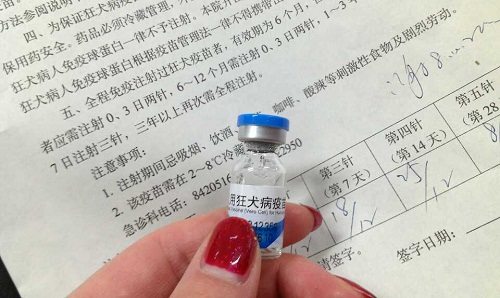
There are many misconceptions about rabies, the fatal disease caused by animal scratches and bites that kills around 3,000 people in China every year. I don’t have to worry about it now thanks to my family, who urged me to get vaccinated right after my dog gave me an innocuous scratch that I almost overlooked.
Days after I received one of the series of shots, some friends (both expat and local) were still confidently telling me I did not need them because my dog was vaccinated. I think that this one of the most fatal and common misconceptions. Vaccinated animals can still carry the rabies virus from direct and indirect contact with other animals, and being vaccinated only guarantees their safety from the disease.
Another misconception is that some people think scratching is not as bad as biting because the rabies virus is carried through saliva. In fact, any pet owner can tell you how often their dog or cat licks its front and hind paws. This was why, when my dog scratched my toe and broke the skin, we treated it as seriously as a bite. Under pressure from my family, I washed the exposed skin with water and soap and disinfected it with iodine solution, which later the doctor said was the right thing to do.
It is also natural to assume that you can get the vaccination at any hospital, but this is not true. I headed to Wangjing Hospital the next morning after I was scratched and was told to go to China-Japan Friendship Hospital.
Here (Chinese-only) is the list of local hospitals that you can get rabies vaccinations from in Beijing. Beijing United Family Hospital also offers rabies vaccinations.
Rabies is a viral disease transmitted by infected saliva from animals such as dogs, cats and bats through bites or scratches. It is fatal if no previous or immediate vaccination is given after contact.
For suspected patients who have never been vaccinated before, four to five doses the rabies shot are administered over a period of one month. The sooner the shots are received, the more effective the doses are. The first 24 hours after the bite/scratch is considered to be crucial, so it is better to know ahead of time which hospital to head to. In addition, go straight to the emergency department (instead of wandering around in the out-patient area).
For serious bites and scratches, rabies immunoglobulin will also be recommended by the doctor (I didn’t need this). The vaccinations (four to five doses for post-exposure; three doses for pre-exposure) are good for six months. But if the wound is bad, see a doctor regardless as a booster may be needed in some cases.

Most importantly, teach your children how to prevent bites and scratches, especially from dogs. Here are some tips from by the American Academy of Pediatrics (via myhealthbeijing.com):
- Socialize your pet. Gradually expose your puppy to a variety of people and other animals so it feels at ease in these situations.
- Train your dog. Commands can build a bond of obedience and trust between the dog and owner. Avoid aggressive games with your dog.
- Vaccinate your dog against rabies and other diseases.
- Neuter or spay your dog. These dogs are less likely to bite.
- Never leave a baby or small child alone with a dog.
- Teach your child to ask a dog owner for permission before petting any dog.
- Let a strange dog sniff you or your child before touching it and pet it gently, avoiding the face and tail.
- Never bother a dog if it is sleeping, eating or caring for puppies.
- Do not run past a dog.
- If a dog threatens you, remain calm. Avoid eye contact. Stand still or back away slowly until the dog leaves. If you are knocked down, curl into a ball and protect your face with your arms and fists.
Photos: Clemence Jiang and Paul Ryding



